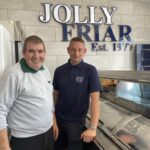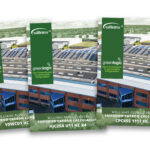Eric Snaith has responded to the changes in eating habits brought about by the Covid pandemic and adapted his businesses in Thornham, Holt & St Ives, Norfolk, at every turn. We caught up with Eric to see how his restaurants and takeaways were faring after a busy summer
What have been the biggest gains over the last 12 months for Eric’s Fish & Chips?
The popularity of click and collect has been the main one. We introduced that at the start of the first lockdown, like everybody else. We do a really good steady trade off that now and I don’t think that would have ever been as big a success had it not been forced on people. The increase in tourism in our area last summer was huge too. We’re lucky with the type of business we are that we’ve been able to maximise numbers as we’ve got quite a bit of outside space. Not everybody has that luxury.
Is the outside area something you’re looking to expand further?
Yes, we’re looking at investing in a bigger outdoor play area and improving the outside space because I think, regardless of Covid, people now like to eat outside if they can.
Where has the business seen the biggest losses?
The sites have become very takeaway heavy. Even now people are still keen to eat outside, in the car or at home whenever possible. I’d say we used to do at least three times the amount of eat-in that we do now. On the back of that, we get a little less revenue because we charge less for takeaway, which does hit our margins. Also, we find if people are eating-in they spend more on drinks and they have second drinks and order desserts. But if they are eating outside, they don’t want to queue up again so those sales have just dropped completely.
Have you introduced anything to make up for those lost sales?
Yes, at Thornham we put an outside bar in an old shipping container although the weather dictates if it’s worth opening it or not. We’ve also adapted the restaurant and changed the way people queue so that customers are waiting under a covered heated space outside rather than queuing tightly together inside. And we’ve put in a new 11 pan frying range that has enabled us to still do the restaurant, takeaway and click and collect orders and get them out quickly and efficiently so customers aren’t waiting.
Looking back now, how do you think you’ve done through the pandemic?
I think like anyone in these coastal, rural areas we’ve done pretty well and certainly, if you look across hospitality in general, I’m pretty happy with where we are now. I think there’s been a lot of new customers as new people discovered Norfolk and holidayed in the UK last year. It means we’ve been able to keep investing in the business, which improves the revenue and makes the business better. But rather than nice gradual increases, it feels like we’ve been up and down mountains. We’ve either been flat out, shut for periods of time or, when we went through that stage where the government said you can’t travel outside your area, trade just nosedived.
How are you finding staffing?
That’s the big challenge, isn’t it? Locally, the demand for staff is so high because there are so many places that are busy and there are just not enough people to work them. Last summer, I think people were panicking and paying whatever they had to because they needed to take the business while it was there so it meant the average wage went right up.
Have you put wages up?
No, as a business we knew we couldn’t afford to just pump everyone’s money up because come the winter we’d be in a bit of a pickle. We pay well anyway, between £10-12 an hour depending on the position, so instead what we’ve done is try to be as fair as possible with people, to be good employers and be flexible with people. One of the things we’ve introduced across the businesses is a 47 hour week and anyone that does over those hours gets paid overtime. It’s doesn’t sound exactly groundbreaking, but for hospitality it really is. When I was growing up you did 60 hour weeks and that was standard. At least this way if we’re short and staff want to pick up the extra work they get paid fairly for it. In the summer months, we employ over 100 people – that goes down to about 50-60 in winter – but we haven’t lost that many staff across the group, which I think is because we treat people well and fairly.
You opened Eric’s Pizza at Thornham just before lockdown, how’s that doing?
That does really well, especially when the kids are off as it’s a great family meal and it works perfectly alongside fish and chips. I think one of the biggest benefits is the fact that both businesses are next door to each other and share the outside space. We get so many people wanting to mix and match.
How are your margins looking?
Well, that’s the other negative impact of Covid, the cost of sale. Everything has gone up. It’s taken about 2-3% off our margins. We had a price increase last April and I think we’re looking at another 5% this April, which will take eat-in fish and chips to about £11.50. The big benefit we’ve had is the VAT reduction and I hope the government considers keeping it a bit lower, at either 12.5% or 15%. For us, that percentage decrease has been what’s allowed us to keep investing in the business. We would have just been treading water and just making do had it not been for that. Also, if VAT stays low, businesses can pass that on to their staff. There’s a shortage of staff because, across the board, hospitality doesn’t pay well yet we’re at the maximum margin we can pay on staff.
You are doing a few more at home items, how have they come about?
We’re trying to diversify what we’re doing within the existing businesses and think of things that will keep our staff levels up through the winter so we haven’t got such a fluctuation. We’ve sold the bottled sauces for some time and now we’re looking at doing a frozen pizza that customers can buy in our shops to take home. This summer we want to try and get them in three or four local shops and then the plan next winter is to increase production and go a little bit further afield. We’ve just started making homemade pies for the chip shop, the first being a beef shin, beer and brown sugar variety. We’ll hopefully start producing those to sell as a cook at home item too. I think they will work well as there aren’t that many handmade premium pies available.
You introduced delivery at St Ives, how’s that going?
Really well. We’ve partnered with Deliveroo and we use their drivers. About there months ago we introduced a street food menu there too and put on a few types of chicken burgers, southern fried chicken that we make ourselves using fresh chicken, loaded chips, fried halloumi and hot dogs and they have proved popular on delivery. We touched on delivery at Holt and Thornham using our own drivers – Deliveroo don’t cover those areas – but the cost of paying drivers and having the right insurance just proved too expensive. It’s a shame because delivery is a market we want to take advantage of and, yes, the aggregators take a big cut but with the marketing power they have, they get to customers you don’t even know about.
Has your experience throughout the past two years changed you as an operator?
I’m certainly more stressed and a bit more grey and I probably drink more than I should! But, yes, I suppose I’m very grateful for being open and being busy. And it’s reinforced for me that we are a good business because we have been resilient and survived some really big challenges. I guess I appreciate the busy times more now too.









